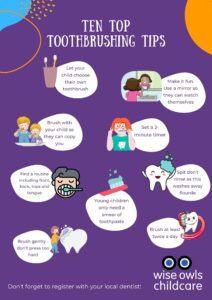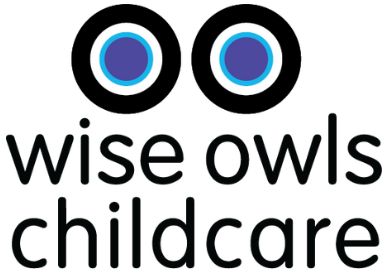Importance of Oral Health
Dental decay is the most common oral disease affecting children and young people in UK, yet it is largely preventable. Practising good oral health in a child’s early years is important for forming positive habits and protecting young teeth.
Good dental health can be achieved in three ways:
- Keeping sugary and acidic food and drinks for mealtimes only or avoiding them altogether
- Brushing teeth at least twice a day with a fluoride toothpaste
- Visiting the dentist regularly
Toothbrushing
The most important thing you can do to prevent dental decay is use appropriate fluoride toothpaste. Not all children like having their teeth brushed, so you may have to keep trying. Make it into a game, or brush your own teeth at the same time and then help your child finish their own.
What keeps teeth healthy?
Discuss this question with your child. Some ideas include; brushing teeth with toothpaste in the morning and at night, eating and drinking tooth friendly things, and going to the dentist for them to count and check our teeth.
How should I brush my child’s teeth?
The easiest way to brush a baby’s teeth is to sit them on your knee, with their head resting against your chest. With an older child, stand behind them and tilt their head backwards.
How much toothpaste should my child use?
For children under three years old use a smear of toothpaste. Children between three and six years old should use a pea-sized amount of toothpaste. Spit out excess toothpaste after brushing but do not rinse with water as this washes away the fluoride. Do not let your child lick or eat the toothpaste from the tube.
How often should my child brush their teeth?
Gradually start brushing your child’s teeth more thoroughly, covering all the surfaces of the teeth. Do it at least twice a day: just before bed and at another time that fits in with your routine.
Supervise brushing to make sure your child gets the right amount of toothpaste and they’re not eating or licking toothpaste from the tube.
Carry on helping your child brush their teeth until you’re sure they can do it well enough themselves. This will normally be until they’re at least 7.
Healthy Eating
Sugar is the number #1 cause of tooth decay. Each time we eat sugary food and drink, the bacteria in dental plaque produce acid that attacks teeth. If we eat or drink sugary foods frequently throughout the day, we have more ‘acid attacks’ which can lead to tooth decay. Give your child a healthy start!
- Breast milk is the only food or drink babies need for around the first six months of their life. Formula milk is the only suitable alternative to breast milk.
- Once you introduce solid foods, you should continue to breastfeed or give your baby infant formula alongside an increasingly varied diet until they’re at least one year old. Cows’ milk as a drink can be introduced from 12 months.
- Only breast or formula milk or cooled, boiled water should be given in bottles.
- From the age of six months old bottle fed babies should be introduced to drinking from a non valved free-flow cup. Bottle feeding should be discouraged from 12 months old.
- Only give water or milk between meals and do not add sugar or honey to foods or drinks.
- The frequency and amount of sugary foods and drinks should be reduced. Cut down on added or ‘free sugars’ (sugar added to food and drinks as well as naturally occurring sugar in unsweetened fruit juices, honey and syrups. It does not include the sugars naturally found in milk and milk products and in whole fruit and vegetables).
- We should restrict the amount of ‘free’ sugars we eat daily to less than 5% of total dietary energy. The recommended maximum intake of free sugars is no more than 19g per day = 5 sugar cubes for 4-6 year olds, 24g per day = 6 sugar cubes for 6-10 years olds and 30g per day = 7 sugar cubes for 11 years and over
- Avoid sugary foods and drinks just before bedtime.
- Only give sweet foods including dried fruit and fruit juice at mealtimes. Fruit juice counts towards 5 a day but even unsweetened fruit juice is sugary so limit the amount to no more than 150 mls a day from fruit juice, smoothies or both.
Children’s Books with a Dental Theme
Peppa Pig: Dentist Trip, Ladybird Publishing
Going to the Dentist (First experiences with Biff, Chip and Kipper), by Roderick Hunt
Maisy, Charlie and the Wobbly Tooth, by Lucy Cousins
Going to the Dentist (Usborne First Experience), by Anne Civardi
The Boy Who Hated Toothbrushes, Zehra Hicks
Tusk Trouble, by Jane Clarke and Cecilia Johansson
Mr Wobbly Tooth Must Not Ever Fall Out, by Lauren Child
Open Wide…What’s Inside?, by Alex and Helen Rushworth
Alan’s Big, Scary Teeth, by Jarvis
The Night Before the Tooth Fairy, by Natasha Wing
Toot & Puddle: Charming Opal, by Hollie Hobbie
The Underhills: A Tooth Fairy Story, by Bob Graham
Tooth Fairy in Training, by Nancy Raines Day
The Crocodile and the Dentist, by Taro Gomi
Demon Dentist, by David Walliams
Crocodile Snap!, by Little Bee Books
The Tricky Tooth, by Fran Manushkin
I Love My Fangs, by Kelly Leigh Miller

